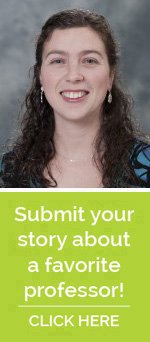 CULLOWHEE – For Dr. Carmen Huffman, the chemistry lab never stands still.
CULLOWHEE – For Dr. Carmen Huffman, the chemistry lab never stands still.
“Each student has unique strengths and weaknesses, and I love working with them on their own personal journeys of learning chemistry and developing as a lifelong learner,” she said. “Each day, I learn more chemistry, I learn more about education, and I learn more about the human spirit. What more could I ask for?”1
Huffman, an associate professor of chemistry at Western Carolina University, was recognized this year with a UNC Board of Governors Excellence in Teaching Award. She was recognized for teaching not just chemistry, but life skills as well through her use of Process-Oriented Guided Inquiry Learning (POGIL), where teams of students confront challenging real-world problems.
A peer said that in addition to teaching students physical chemistry, “she teaches them how to be curious about what they are learning, to ask good questions, and to have their own courage to seek answers for themselves.”2
She explained the method in an interview:
“Not only do they gain a deeper understanding of the material, but they also learn important communication and teamwork skills that they can use for the rest of their lives in both an academic setting as well as the workplace. However, in chemistry, as in most disciplines, practicing scholarship activities is the really the best way to learn. Hands-on research in the lab is where students encounter the ultimate problem-based learning environment with an authentic project that takes them through the scientific method from beginning to end. These opportunities give students the best experience in what it’s like to be a chemist.”3
After receiving the Board of Governors teaching award, Huffman was asked to speak at commencement exercises May 6 for Western Carolina’s graduate students. She told the graduates about “the butterfly effect,” a term coined by meteorologist Edward Lorenz in the 1960s.
“He discovered that the slightest differences in his initial conditions caused significant differences in weather outcome,” she said. “The overall idea of the butterfly effect is that a small, seemingly insignificant action can have a large effect on a future outcome.”
Huffman challenged the graduates to be butterflies themselves.
“Make an impact in your world,” she said. “Take actions that will nudge the future in the right direction. The scale of your acts doesn’t matter, just the significance. Big or small, it all matters. It all makes a difference. You can make a difference, and I hope that you will.”4
1 http://news-prod.wcu.edu/2016/03/carmen-huffman-named-recipient-unc-system-teaching-honor/
2 Ibid.
3 https://www.northcarolina.edu/content/Carmen-Huffman-0
4 http://www.citizen-times.com/story/news/local/2016/05/07/wcu-holds-3-spring-commencement-ceremonies/84079376/.

Leave a Reply